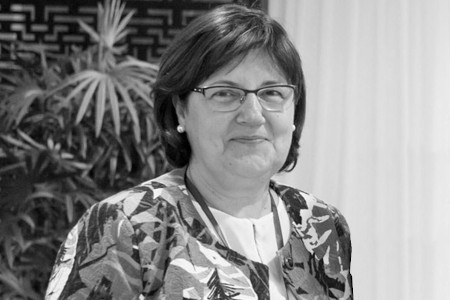
Dra. Catalina Ruiz
The Royal European Academy of Doctors-Barcelona 1914 (RAED) deeply regrets the loss, on August 8, of its elected academician Catalina Ruiz, professor of Applied Physics at the University of La Laguna and regular collaborator of the RAED. Awarded with the Canary Islands Research Prize, she worked in the Laboratory of X-rays and Molecular Materials of the Faculty of Science of this university of Tenerife until the disease allowed her. Her research lines focused on nanotechnology, crystallography, diffraction, molecular materials, crystalline engineering, structural characterization, structure-property relationship and molecular magnetism. She participated in more than twelve R&D projects in public calls, inside and outside Spain. She also collaborated in more than 290 publications and scientific-technical documents and participated in R&D contracts of special relevance with companies in numerous congresses, courses and seminars. She also directed more than a dozen doctoral theses. A disappearance that occurred on August 8 and that adds, also this summer, to those of another renowned physicist also linked to the Academy: Luis Ruiz de Gopegui, who was the Spanish responsible for the control of the lunar missions of the Apollo project from NASA.
José Ramón Calvo, full academician and president of the Institute of International Cooperation of the RAED, gloses the figure of both: “I personally met the two and both of them I keep an endearing memory, although I must say that while contact with Ruiz de Gopegui was more occasional, on the occasion of his participation in the year 2006 in the Campus of Excellence held that year in Fuerteventura, where he gave a keynote address and participated in a subsequent debate on the arrival of man on the moon with a NASA astronaut. The relationship with Caty Ruiz was very close and it was much more than a professional relationship, I admired her perseverance, her talent for science, her passion for research and especially her bonhomy, she was above all and above all a beautiful person. In spite of the mistreatment that she suffered at certain moments of her professional career by some of her university colleagues, the obvious result of envy and mediocrity that unfortunately systemically affects many areas of the Spanish university, I never heard a bad word, never complained about those unfair and malicious opinions that despite affecting her, she fought with the force of truth, her entrepreneurial spirit and especially as the greatest scientists do, with their unquestionable professional contributions”.
Ruiz was an outstanding and distinguished student of the Nobel prize in Chemistry Robert Huber, who directed her doctoral thesis at the Max Planck Institute. There she shared laboratory, office, successes and worries with two other Nobel prize winners in Chemistry: Johan Deissenhofer and Hartmut Michel. The elected academician was a reference in many Latin American countries, especially in Peru, where she was an advisor to the Government and where she traveled frequently. Her last project, which unfortunately can no longer be carried out, was a Nobel Conference in Arequipa in which the Royal Academy was also going to participate. “Her tenacity and enthusiasm was such that until less than two months ago we were talking to see how that project could be carried out, when her condition allowed it, despite knowing both that the terrible disease she was diagnosed a year ago it made very difficult to materialize”, explains Calvo.
The General Board of the RAED elected her unanimously as full academician “and in one of our last conversations, in mid-May, she told me that as soon as she recovered she wanted to finish her admission speech. That was Catalina Ruiz, the only woman which has so far received the highest award granted by the Government of the Canarian Community to distinguish its best scientists, in addition to the Linus Pauling Prize awarded by the British Royal Chemistry Society, the Hermilio Valdizán Medal of Honor of the Hermilio Valdizán National University of Huanuco or the special mention of the prestigious Humbolt Foundation“, concludes the president of the Institute of International Cooperation.


